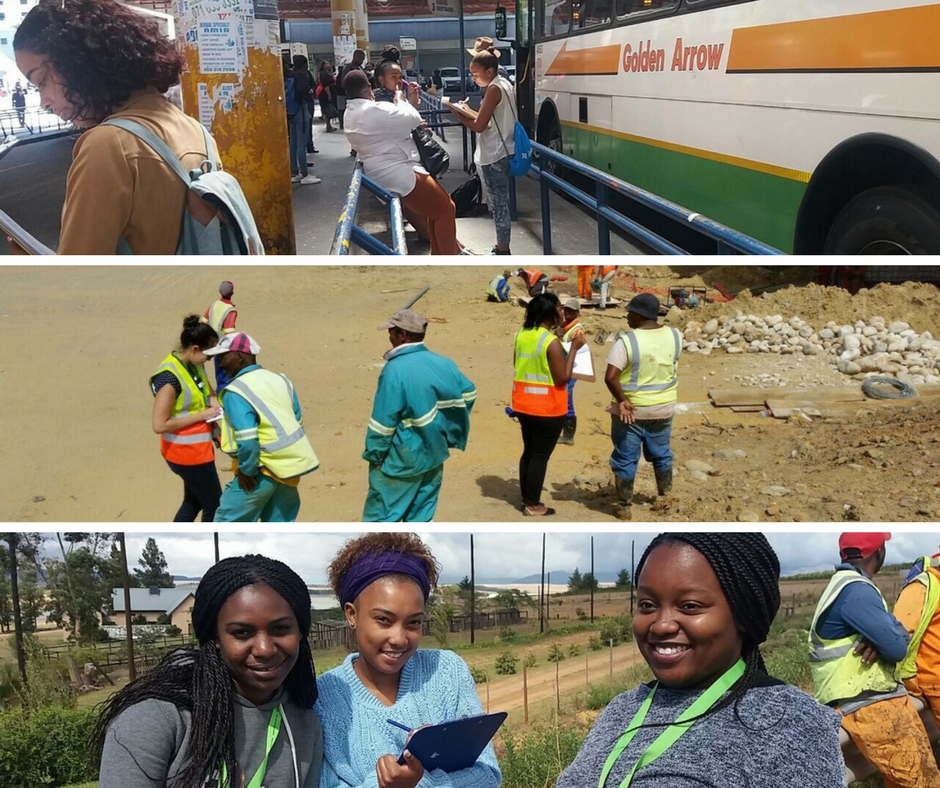A research team of 10 BcomHons in Public and Development students took part in a three-month internship with the School of Public Leadership from 29 January 2017. The aim of the internship was to evaluate three different programmes from the Western Cape Department of Transport and Public Works, namely, Public Roads Maintenance Grant (PRMG); Public Transport Organizational Grant (PTOG); and Extended Public Works Program (EPWP). These evaluations encompassed a research process which included, data collection, data capturing and site visits. Once the data was collected and captured, the team prepared a report that expressed their findings, recommendations and conclusions in terms of each programme.
The purpose of the evaluation
The PRMG evaluation was to see if the government grant was being used efficiently to empower local businesses, labourers and contractors. The PTOG evaluation was to find out the views of the bus users on whether the service was affordable or not and whether they were satisfied with the access of the bus service.
Overview
The research project was carried out for the Western Cape Department of Transport and Public Works by the School of Public Leadership (SPL) at Stellenbosch University (SU) in collaboration with the Cape Higher Education Consortium (CHEC). The research focused on the government road maintenance grant and public transport grant under PRMG survey and PTOG survey. Data was collected by the research team from different sites. The PRMG evaluation data was collected at the construction sites that had been selected which met the criteria of the sample. Structured questionnaires were administered to the contractors, labourers and businesses at the sites. For the PTOG survey, structured questionnaires were administered to the bus users at the main bus terminus in Cape Town and other various bus stops around the CBD that met the criteria of the sample. Furthermore, stories of change were also collected through the same process and an online survey was carried out with other bus users. The data was captured in SPSS and used to write up the final report for the research project which covered the findings, recommendations and conclusions. This report will feed into future planning and evaluation processes of the Department for Transport and Public Works.
Skills and benefits
Throughout the internship programme, various skills and benefits were gained. All of the skills, benefits and lessons learned may be useful for the future. The following skills were gained:
- Data collecting, data capturing and data analysis
- Report writing and writing skill improvement
- Administration skills (PowerPoint, excel, word, scanning and printing, filing)
- The value of team work
- Public speaking
- Constructing and administering questionnaires
- Conflict resolution
- Communication skills
- People management
- Working with SPSS
The following benefits arose:
- Knowledge on monitoring and evaluation, theories of change and research methodology
- Knowledge on the transport system of the Western Cape
- The ability to work under pressure
- Increase in confidence
Overall, the project was useful to apply some of the theoretical knowledge to practice and to understand the relevance thereof in the public sector.
In conclusion the internship was a knowledgeable experience that equipped the research team with many new research tools to assist them in future endeavors. The desired aims of the respective evaluations were successfully reached within the three month period. Furthermore, the internship served as a fundamental platform for Honours students to test their capabilities and grow within their field of study.


Honours students research team (top row, f.l.t.r.): Mnqweno Mvundlela, Namakau Mwala, Leocadia Ngoma, James Von Bardeleben, Eloise Sitler; and (bottom row f.l.t.r.) Nicole Daries, Danielle Vraagom, Liz Brown, Carol Cedras and Ratidzo Muchena.

